
Daniel Johnson Jr., is a former Canadian politician. He was a member of the Liberal Party of Quebec and was the 25th premier of Quebec for nine months in 1994 until his party's defeat in the provincial general election.

U.S. Bancorp is an American bank holding company based in Minneapolis, Minnesota, and incorporated in Delaware. It is the parent company of U.S. Bank National Association, and is the fifth largest banking institution in the United States. The company provides banking, investment, mortgage, trust, and payment services products to individuals, businesses, governmental entities, and other financial institutions. It has 3,106 branches and 4,842 automated teller machines, primarily in the Western and Midwestern United States. It is ranked 117th on the Fortune 500, and it is considered a systemically important bank by the Financial Stability Board. The company also owns Elavon, a processor of credit card transactions for merchants, and Elan Financial Services, a credit card issuer that issues credit card products on behalf of small credit unions and banks across the U.S.

Wesley Livsey Jones was an American politician who served in the United States House of Representatives and the United States Senate representing the state of Washington.

George Washington Emery Dorsey was a Representative in the United States Congress from Nebraska.

Philip Lader, the former US Ambassador to the Court of St. James’s, was Chairman of WPP plc, the global advertising/communications services firm.
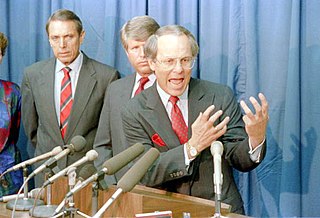
Frank J. Fahrenkopf Jr. is an American attorney, political executive, and lobbyist who was chairman of the Republican National Committee from 1983 to 1989. Fahrenkopf is co-founder, and currently co-chairman, of the Commission on Presidential Debates, which conducts the United States general election presidential and vice presidential debates. In the private sector, Fahrenkopf most recently served as the American Gaming Association's first president, and retired from the position in 2013.

Mary Ann Maxwell Gates was an American businesswoman, executive, civic activist, and school teacher. She was the first female president of King County's United Way, the first woman to chair the national United Way’s executive committee where she served most notably with IBM's CEO, John Opel, and the first woman on the First Interstate Bank of Washington's board of directors.
Elmer Edwin Rasmuson was an American banker, philanthropist and politician in the territory and state of Alaska. He led the family business, National Bank of Alaska, for many decades as president and later chairman. He also served as Mayor of Anchorage from 1964 to 1967 and was the Republican nominee for United States Senator from Alaska in the 1968 election, losing the general election to Mike Gravel.
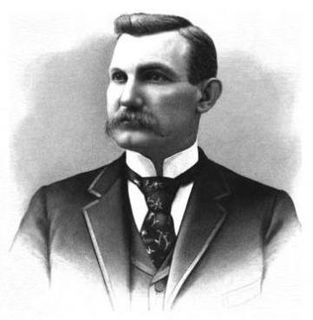
Captain William Rankin Ballard was a Seattle pioneer, banker, and land developer. He was one of the founders of the city of Ballard, Washington which was later annexed to the growing city of Seattle, Washington in 1907. As acting manager of the Seattle National Bank in the early 1890s, he facilitated the construction of what is now known as the Interurban Building in the Pioneer Square neighborhood.
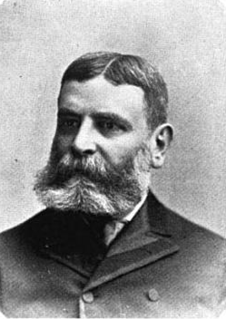
Edward Daniel Hayden was a U.S. Representative from Massachusetts.
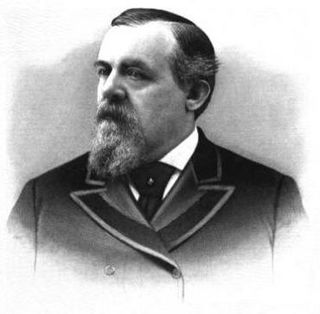
Henry G. Struve was a prominent lawyer, legislator, historian and banker in Seattle, Washington, during the 19th and early 20th centuries. A member of the celebrated Struve family, he was elected mayor of Seattle in 1882 and 1883, during a time of rapid civic growth and prosperity.

Jacob Furth was an Austrian Empire-born American entrepreneur and prominent Seattle banker. He played a key role in consolidating Seattle's electric power and public transportation infrastructure, and was a member of Ohaveth Sholum Congregation, Seattle's first synagogue. Bill Speidel called him "the city's leading citizen for thirty years," adding that Furth "may even have been the most important citizen Seattle ever had."

John Daniel Cartano was an American lawyer.

Daniel Hunt Gilman was an American attorney and railroad builder who made his career in Seattle.

Charles Moore (1855-1942) was an American journalist, historian and city planner.

Sydney Floyd Landreth was an American lawyer, banker and Republican politician from Galax, Virginia who represented the 14th state senatorial district for two decades. He ran unsuccessfully for Governor of Virginia in 1945.

John Leary was an American businessman and politician who was a key civic leader in Seattle, Washington. He made contributions to virtually all civic and business activities during the city's early years.

John Joseph Donovan was a Washington State pioneer and the president of the state Chamber of Commerce, as well as one of the key founders of the City Council of Bellingham, Washington. During his life, Donovan actively participated in political, industrial, and commercial activity on city, county, and state levels. Several historic landmarks exist in Bellingham honoring J. J. Donovan, including his house, which was added to the National Historic Register, and a bronze statue installed in Fairhaven, Washington.
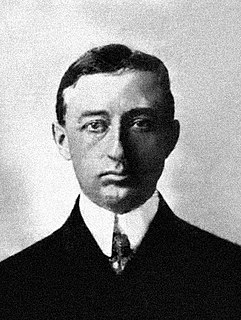
Francis Herbert Brownell was a Washington state pioneer, lawyer, and businessman. During his lifetime, he worked in and made contributions to the cities of Tacoma, Everett, Seattle, and New York. As an active pioneer and developer of Everett, he was a member of the hospital board, trustee of the city library, director of the First National Bank, and president of the Chamber of Commerce.
The National Bank of Commerce in New York was a national bank headquartered in New York City that merged into the Guaranty Trust Company of New York.
![]() This article incorporates text from this source, which is in the public domain : Men of..., American Publishers Association, 1915
This article incorporates text from this source, which is in the public domain : Men of..., American Publishers Association, 1915
















